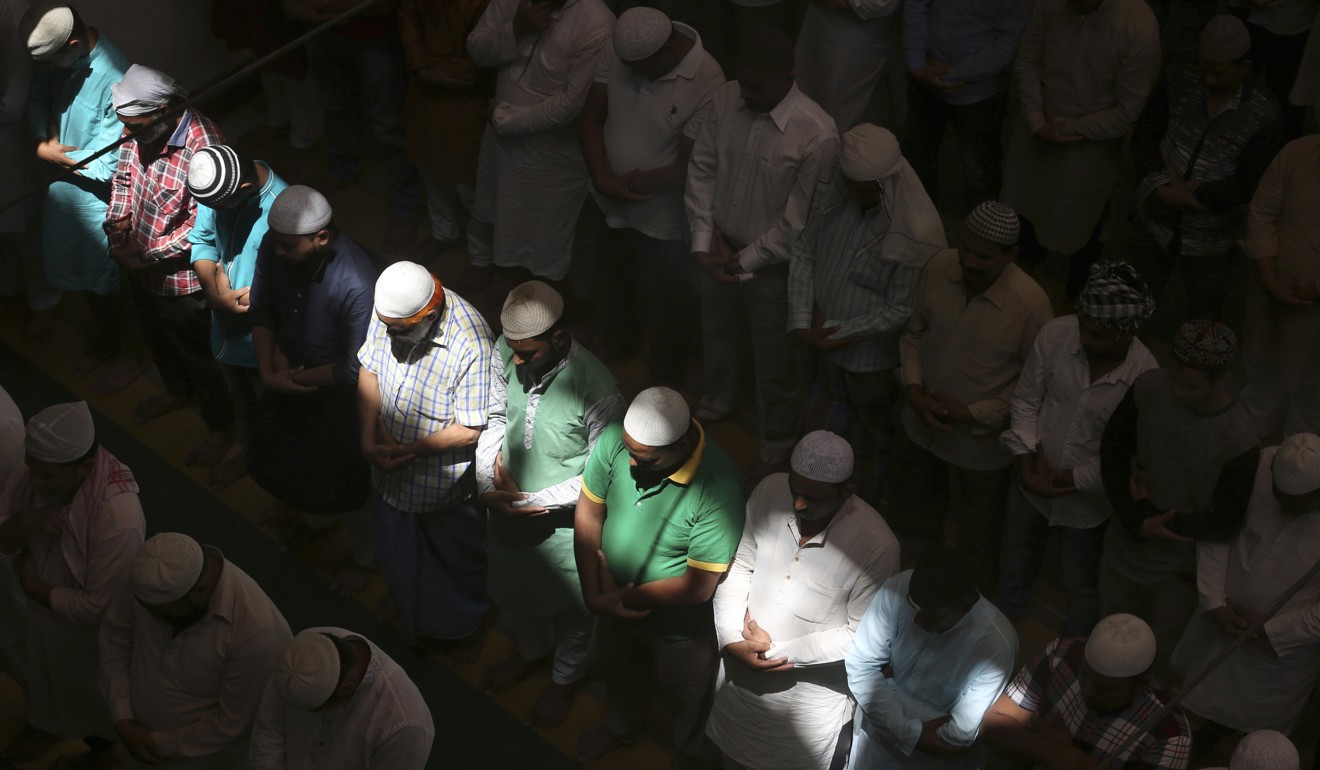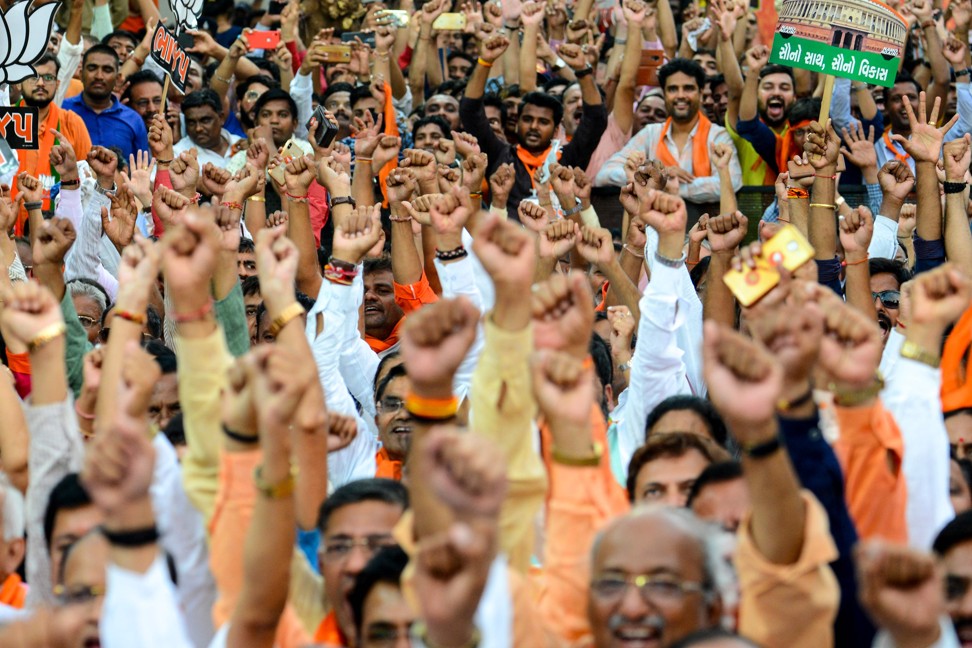Narendra Modi and the BJP’s desire to advance Hindu interests won’t help India realise its ambitions
- Many thought he had made enough mistakes to lose office. However with a campaign that honed in on poorer communities and unsettled India’s social climate, Modi overturned those expectations
- But India cannot realise its ambitions if its ruling party is an active participant in communal conflict within its borders

India’s Prime Minister Narendra Modi stormed into a second term in office by powering his right-wing Bharatiya Janata Party (BJP) to victory last week.
The scale of the triumph, securing 37 per cent of the vote and 303 of 542 seats in the lower house of parliament, was bigger than his first in 2014.
Sections of India, particularly its liberal intelligentsia, were shocked about his return to power, given that he seemed to have done everything to be voted out.
Modi’s decision to demonetise high-value currency notes in 2016 ravaged the informal economy; a new sales tax compounded difficulties for business; agrarian distress became widespread and unemployment hit new highs. The social climate in the country was damaged by his party and supporters, through regular hate speech and violence directed at Muslims and other minorities.
Liberals hoped for a change of leadership and a measure of domestic peace. But Modi, who will be sworn in on Thursday, overturned these expectations with a combination of strategies.
Firstly, he was aided by the natural advantage of being in government. His party is by far the best-funded in the political sphere, enriched by anonymous electoral bonds introduced in recent legislation.
During the campaign, the BJP spent lavishly on advertisements while mainstream media gave him unfettered and largely uncritical coverage. He is literally visible everywhere in India – on digital, in print, on billboards, radio and film. Public institutions have not dared to cross him. The Election Commission overruled complaints about his conduct during the campaign.
Riding those advantages, Modi ran an aggressive campaign focused on nationalist themes and castigated the opposition Congress party’s record in power. He talked up India’s air strikes against Pakistan following a terror attack in the state of Jammu and Kashmir – projecting himself as the guarantor of the country’s security.
Critics also underestimated the power of his welfare spending. His government built houses, toilets and provided cooking gas, generating support among poorer communities.
One analyst wrote that an impression of Modi had taken hold: that his work was in progress, and that as a well-meaning prime minister, he needed more time to deliver on his promises.
The BJP also has a peerless political machine, with millions of volunteers from its parent body, the Rashtriya Swayamsevak Sangh (RSS), giving the party a firmer grasp of local dynamics and the ability to build more strategic social coalitions. And together, Modi, the BJP and RSS seem to have produced a politically oriented Hindu sensibility that transcends other forms of belonging such as caste, language and region.
This has a longer provenance, drawing on developments in popular culture such as mythological television dramas, nationalist films, religious televangelists, conservative family soaps – and the history of Hindu nationalist movements since the mid-1980s.
Modi has benefited from a range of cohorts that stemmed from these sources, from devout citizens merely expressing a Hindu religious affiliation through voting to youth seeking a leader who promises jobs to the hardened social media trolls devoted to the BJP.

The troubling aspect about these dispositions, however, is that they all ignore the violent marginalisation of minorities that has been central to BJP’s efforts to forge a majoritarian identity.
BJP leaders speak as if they want to snap the web of associational life between Hindu and Muslims that has existed for centuries. Their lawmakers have called for not allowing Muslims into their homes and for Islam to be uprooted from the country.
Antipathy toward Pakistan because of its support for terrorism has segued into open hostility towards Indian Muslims, with many Indians reportedly content that Muslims, a minority of 200 million, have been “shown their place”.
All this naturally provokes concern about India’s social cohesion as Modi assumes his second term. He is seeking to change tack now and called for inclusiveness in a speech after re-election. But he may not be able to recall on a whim the energies of his charged supporters, who have been reared through years of noxious material and forwarded messages on WhatsApp.
There are other reasons why polarising politics may continue. The BJP and the RSS see the making of India into a Hindu nation as an unfinished project and are on an ideological overdrive; the economy is expected to continue struggling and there is little reason to believe the government’s competence will improve just because it secured a second term.
All this will necessitate a steady stream of diversionary politics marked by the targeting of Muslims and liberals – who are portrayed as entitled elites that spout foreign ideas. There are other concerns about checks and balances and independence of public institutions given Modi’s bolstered mandate, but what is more critical is the effect of his win on the political system as a whole.
Modi and BJP-RSS are, in effect, reconfiguring India’s democracy in the public imagination.
The country has thus far been known as a collective of identities bound together by a Constitution that accords equal rights to all individuals and groups. The BJP is seeking to privilege Hindu interests at the expense of the rest – it conceives of national politics as the domain of Hindus alone and hence fielded only six Muslim candidates in the polls, all of whom lost.
To reinforce this shift, its supporters are now arguing that liberal dissent must end as the new mandate vests all authority in Modi. A crude majoritarianism is being sought to be imposed via a cult of personality under the guise of the will of the people – one that disregards principle and fails to see democracy as a perennial deliberative process.
This does not bode well, unless Modi changes course. India cannot become a great power if its ruling party is an active participant in communal conflict within its borders.
Sushil Aaron is a political commentator.
